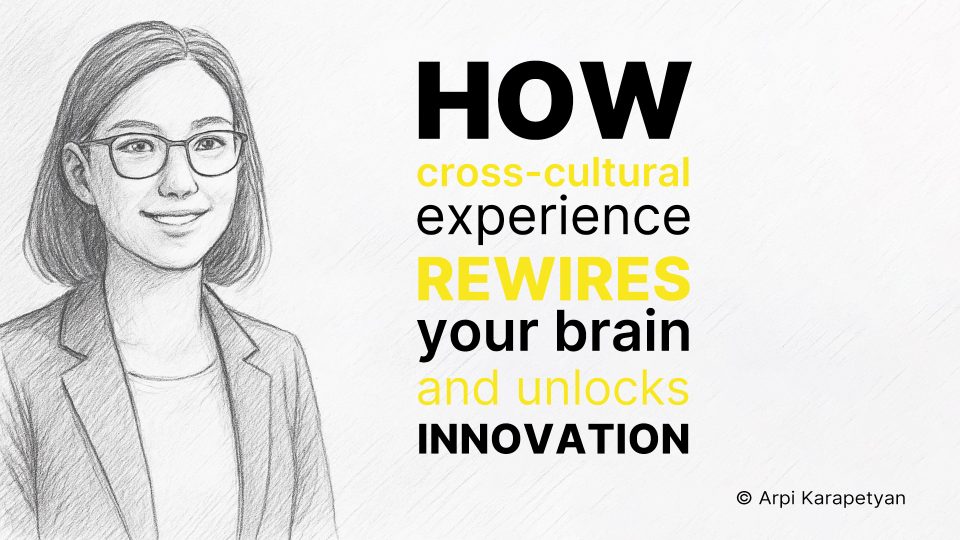I am writing this from Atlanta, US, where I flew across the ocean to facilitate at the North America Leadership Alliance (NALA). A space where people from different cultural, professional and personal backgrounds have come together to grow as leaders.

Since I travel a lot, I recently took a moment to reflect on how much I have changed, both personally and professionally, since I began engaging deeply with different cultures. It is more than learning new customs or tasting new cuisines (which I enjoy a lot). Something shifted inside me.
I begin to think differently. I listen more. Judge less. Connect faster. And once I recognized that change in myself, I felt compelled to write this article.
I have to state! Cross-cultural experiences, are among the most powerful tools we have for shaping not only our personalities, but also our capacity for empathy, innovation, and leadership. And the science agrees.
The Psychological Shift: From Certainty to Complexity
Psychologist Milton Bennett introduced the idea of a developmental model of intercultural sensitivity, in which we move from ethnocentrism (viewing one’s culture as central) to ethnorelativism (understanding behavior in cultural context). This isn’t just a theory, it’s a pattern many of us go through when we step outside our own culture.

Studies by Maddux and Galinsky found that individuals who had lived in and engaged with foreign cultures showed significantly higher levels of creative insight. Their ability to approach problems from different angles improved because their thinking had been diversified through experience.
This effect is known as integrative complexity, a psychological trait that describes your ability to hold multiple perspectives at once and synthesize them. It is essential for innovation, leadership, and navigating in different situations. And it develops naturally through multicultural experiences.
What Happens in the Brain
Neuroscience supports this shift. The brain’s neuroplasticity, the ability to rewire based on new inputs, is especially active when we encounter unfamiliar norms, languages and perspectives. These inputs challenge our mental shortcuts and force us to form new pathways.

Denise Park’s research shows that cultural learning activates brain regions associated with cognitive control, empathy, and adaptive thinking. In short, engaging with difference literally reshapes how we think and feel.
Cultural Intelligence – A Must-Have Skill
The term Cultural Intelligence (CQ) was introduced by psychologists Christopher Earley and Soon Ang to describe our ability to function effectively across cultures. Unlike IQ or EQ, CQ is not fixed, it grows with exposure and reflection.
High CQ individuals:
- Adapt faster in global teams
- Handle ambiguity and conflict better
- Show stronger leadership across diverse environments

A 2011 meta-analysis found that CQ is a stronger predictor of success in multicultural work settings than even emotional intelligence.
Cross-Cultural Thinking is equal to Innovation
One of the most interesting findings from psychological research is that conceptual expansion, the mental process that drives creativity, increases with multicultural exposure. When we interact with unfamiliar values and systems, our brain starts connecting dots in new ways.

Multicultural experiences foster unusual associations, which is truly the fuel of innovation. As Maddux, Galinsky, and Tadmor concluded in their 2010 study:
Living abroad and learning to adapt to different cultural environments increases the cognitive flexibility and depth needed to be truly creative.
A separate McKinsey report (2020) also found that companies in the top quartile for ethnic and cultural diversity in their executive teams were 36% more likely to outperform on profitability than those in the bottom quartile.
Why It Matters Right Now
We live in a world of global crises and cross-border collaboration. From climate change to AI ethics, no major challenge can be solved within a single cultural framework. At the same time, 94% of employers say that global cultural fluency is critical for long-term success (Global Employer Survey).
And, Harvard Business School estimates that 70% of international ventures fail due to cultural misunderstandings, not technical errors.
So what can we do? We can create more opportunities for cultural exchange – in schools, at work, in our communities. And we can begin to see cultural difference not as a challenge to manage, but as an advantage to cultivate.
Final Thought
Cross-cultural experiences are not just about knowing more, they are about becoming more. They stretch our minds, challenge our assumptions, and expand our emotional vocabulary.
They make us not just more open, but more capable to see complexity, hold nuances, and build bridges where others see gaps.
In a world that demands innovation, connection, and empathy, cross-cultural experience may be one of the most valuable kinds of growth we can pursue.

